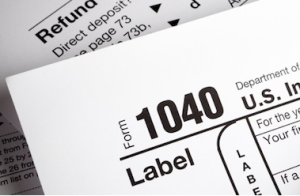 The thought of doing your own taxes can be quite nerve wracking, especially if this is the first time you’ve ever done them yourself. Visions of long forms to fill out, numbers swimming in front of your face, red flags popping up in a government building, and scary Men in Black showing up at your door for an IRS audit are understandably enough to make just about anyone shy away from doing their own taxes.
The thought of doing your own taxes can be quite nerve wracking, especially if this is the first time you’ve ever done them yourself. Visions of long forms to fill out, numbers swimming in front of your face, red flags popping up in a government building, and scary Men in Black showing up at your door for an IRS audit are understandably enough to make just about anyone shy away from doing their own taxes.
But, doing your own taxes may not be as difficult or confusing as you may think. It’s also not a guarantee that you’ll have to endure a major audit.
If you’re thinking of doing your own taxes this year, good for you! You can save hundreds of dollars, and find out that doing your own taxes isn’t as scary as you think. Here are a few tips to help you do your own taxes without going insane.
1. Get Organized
Before you even think about starting your tax return, get organized! Get organized! Get organized! Get all of your paperwork together, including your bank statements, w-2’s, w-9’s, and that shoe box full of receipts that you’ve been saving. You might also want to grab a calculator, and make a note of important information like social security numbers. If you have everything you need in front of you while you’re doing your own taxes, it can be less frustrating and you’re more likely to go right through it without having to stop for a panic break because you’re missing something.
2. Ditch the Pen and Paper
This is the 21st century, and you don’t have to get hand cramps anymore while you’re doing your own taxes. Paper forms are out, and e-file is in. It’s also much easier to do your own taxes with one of the many software programs and websites out there available for you to file your taxes. These types of programs make doing your own taxes simple as pie. All you have to do is answer a few questions and plug in your info. All of the hard stuff, like deciding which forms to use and all that number crunching, is done for you automatically. Two of my favorites are TurboTax and H&R Block. Both are online tax prep websites, and both are free. The one you choose basically boils down to personal preference.
3. Start Early
If you’re planning on doing your own taxes, make sure you get an early start. This means do not wait until April 13th to start your tax return. Getting an early start on your tax return gives you more time to do a thorough job and gives you some leeway for problems that may arise. Remember, you don’t have to file your tax return as soon as it’s finished. If you’re worried about missing some information when you file, you can always save your return and efile it at a later date. Even if you don’t efile your return until April 13th, at least it’ll be done and ready to send.
4. Make Two Stacks
As you’re going through and doing your own taxes, you might find it helpful to make two stacks of papers. One stack for papers that you haven’t input into your tax return yet, and another stack for papers that you’ve already used. I also have gotten into the habit of bending the corners over on papers that I’ve already input into the program. This helps keep me from getting overwhelmed and trying to figure out what’s what and if I’ve already used a particular document.
5. Always Double Check
Before you hit that submit button (or drop your return in the nearest mailbox), make sure you double check it! Did you enter all of the information that needed to be entered? Are there any typos in your name or address? Are all of the numbers you entered correct? This includes social security numbers and bank account numbers. A small mistake or typo on your form could cause problems at the IRS, and possibly delay your refund or result in you paying in more than you have to.
6. Don’t Be Afraid to Ask For Help
Doing your own taxes can be tough, and it’s important that you get them right the first time. If you’re stuck or have a problem, don’t be afraid to ask a professional for help. If you need to ask a tax question, you can always call the IRS at 1-800-829-1040 for individual tax issues, 1-800-829-4933 for business-related tax issues, and 1-800-829-4059 for tax issues for TTY/TDD users. You may also qualify for free tax help from Volunteer Income Tax Assistance (VITA), if you make under $50,000. If you’re 60 or older, you may also qualify for free tax help from Tax Counseling for the Elderly (TCE). If you’re in the military or part of a military family, you can get tax help from the Armed Forces Tax Council (AFTC).






